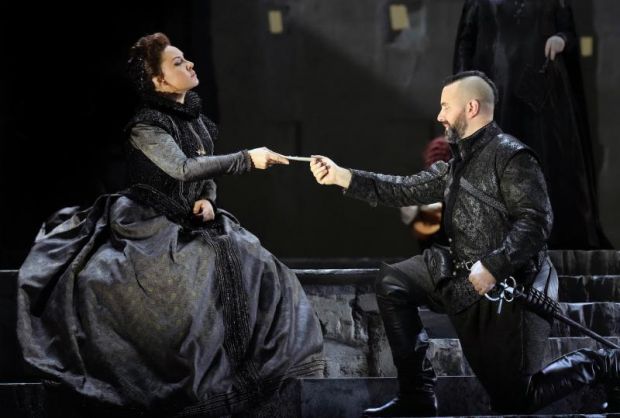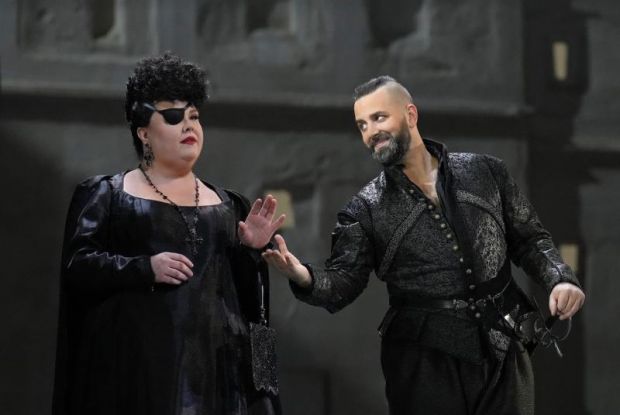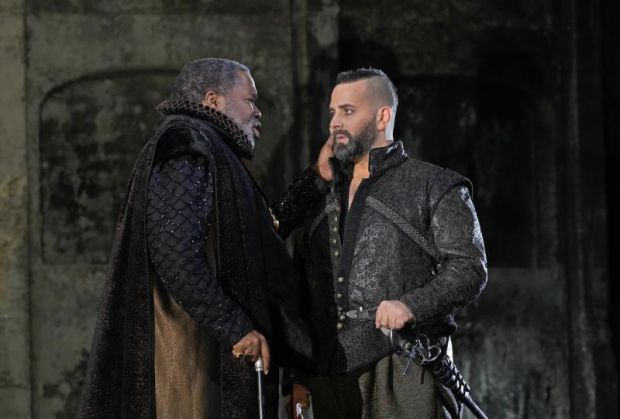Don Carlos
Don Carlos is an epic production in every way. Verdi’s longest opera, this production comes in at approximately four and a half hours and is presented in its original French instead of the usual Italian, taking the production back to its roots. However, the Met’s claim of presenting the original version is in some doubt. It is more like the five act Italian version sung in French with several additions from the original.
But that is not a major concern as the production values are high. This mammoth new staging by Sir David McVicar marks his eleventh Met production and features some Met luminaries and imports. Conductor Patrick Furrer leads a uniformly strong cast, including tenor Matthew Polenzani in the title role, soprano Sonya Yoncheva as Élisabeth de Valois, and mezzo-soprano Jamie Barton as Eboli. Bass Eric Owens and bass-baritone John Relyea are Philippe II and the Grand Inquisitor, and baritone Étienne Dupuis rounds out the principal cast as Rodrigue.
The broadcast also features interviews with the production team, soloists and a peek at a Met future production.

The opera's story is based on conflicts in the life of Carlos, Prince of Asturias (1545–1568). Though he was betrothed to Elisabeth of Valois, part of the peace treaty ending the Italian War of 1551–59 between the Houses of Habsburg and Valois, demanded that she be married instead to his father Philip II of Spain.
Set in a monolithic stone edifice with other elements brought on as needed, the production moves smoothly from location to location. The lighting is suitably atmospheric without obscuring the performers’ emotions.
This production while being statically blocked is music centred. By that I mean the focus is the emotion created by the vocals sometimes at the expense of the physical acting.

Matthew Polenzani’s Don Carlos is in every way heroic, a highlight being a ringing high B natural that transitions into the “Lacrimosa”. This moment in the opera is one of Polenzani’s greatest, singing with intensity and fervour. He exactingly meets the demands of a role that treads the middle ground between dramatic and lyric tenor.
Sonya Yoncheva’s Élisabeth de Valois, while vocally exceptional, does not really convey the passion of two young lovers at the beginning of the opera. This is corrected later, particularly in Act Two’s, “Je viens solliciter de la reine”. Yoncheva rightly makes de Valois majestic in body posture and voice.
Jamie Barton’s Eboli is imposing both in voice and presence. Her “O don fatal” is memorable. She commands every scene and possesses a voice that soars over the orchestra and fills the Met auditorium.

John Relyea’s Grand Inquisitor may be played as a cripple with two walking sticks but is a formidable presence in the opera, wearing a blood red vestment. His booming bass voice perfectly matches his piercing deep set eyes staring out from a cadaverous skull.
Eric Owens, fresh from a successful production of Porgy and Bess, gives a sympathetic yet imposing performance as Phillipe II. The highlight of his performance is the “Lacrimosa”, where he can luxuriate in his lyricism, and here Owens’ legato lines express his sorrow with palpable longing in his voice.
Étienne Dupuis’ Rodrigue shines in his double aria. In his first aria “C’est mon jour suprème”, the baritone gives us gentle legato phrases and wraps them up in sublime pianissimi. He gives the role grace, unlike other versions of this role sung in Italian which rely on forceful singing. In “Ah, je meurs, l’âme joyeuse”, he starts a phrase at piano and crescendos to a forte that is heart rending. It is one of the highlights of the opera!
Don Carlos is an elegant production and a must watch for Verdi fans and everyone that enjoys quality voices.
Barry Hill
More details: www.sharmillfilms.com.au
Subscribe to our E-Newsletter, buy our latest print edition or find a Performing Arts book at Book Nook.

